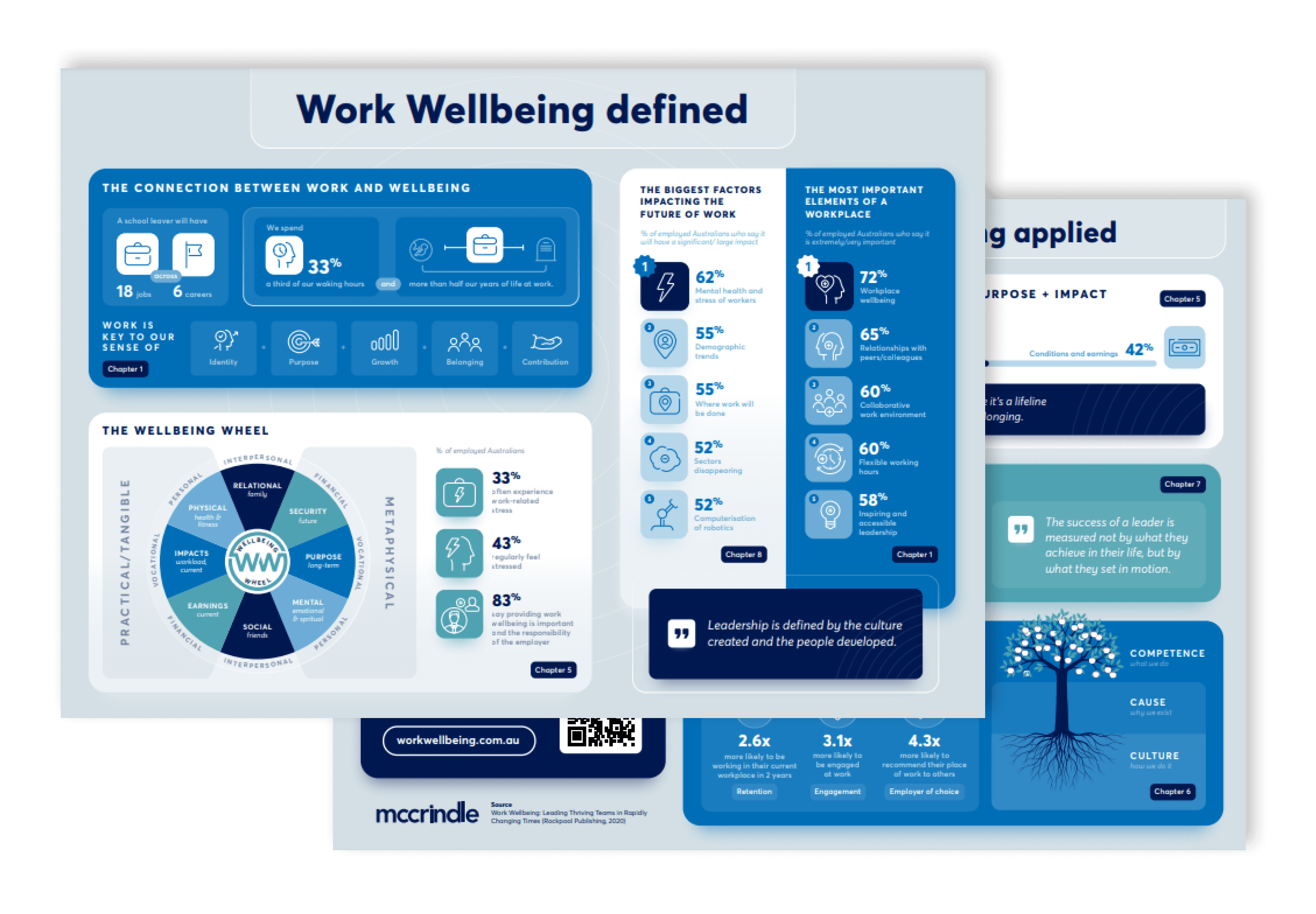Work Wellbeing
What work wellbeing is and why it matters

Work is a big part of our life and contributes to our sense of meaning, purpose, identity and overall wellbeing – that’s why we wrote a book on the topic!
Work is one avenue that people use to find and build social connections, and is key to our growth as an individual, our development as a person and our contribution to society.
We believe that work, businesses and corporations exist not simply to make money, but to better society in general. And that starts with bettering their teams and increasing their sense of wellbeing.
What is work wellbeing?
Work wellbeing is bigger than the surface level aspects of a healthy workplace like fruit bowls, standing desks and ergonomic furniture. These are now expected in most workplaces. While work wellbeing does encompass the different aspects of one’s wellbeing (physical, mental, social, financial and spiritual), it’s really about our works ability to enhance our sense of meaning, purpose and contribution in life. We’ve also closely linked it to thriving, and for people to be thriving at work, oftentimes that does mean stepping out of our comfort zones to seize opportunities and to be stretched in order to learn and grow.
Work wellbeing exists where people are championed above profits. Where the culture is aspirational and inspirational not just transactional. Where people are encouraged and entrusted with growth opportunities. Where leaders are focused on creating a community of customers, clients and teams and where there is a compelling passion for societal good rather than personal gain.
Why work wellbeing matters
In our research for the book, we surveyed a nationally representative sample of 1,001 workers, and we asked about the future of work. Of the seven factors we tested, ‘mental health and stress of workers’ was predicted to have the most significant impact, indicated by 62% of workers. This was above demographic trends, where work will be done, sectors disappearing, computerisation of robotics, global workforce trends and the gig economy.
The reality is that the world of work is changing – from demographic shifts to technological advancements and a global pandemic. Yet it is already being recognised that the health and stress of workers – wellbeing – is an essential factor that will impact and define the future of work. Workplaces need to adapt and respond, so that workers are looked after while also being stretched and grown in capacity in an environment in which they can flourish and thrive.
Steps you can take to improve your work wellbeing
When it comes to shaping a workplace culture of wellbeing and mental flourishing, it is desirable that leaders bring intelligence, but it is essential that they exercise empathy. Leaders who focus on the different aspects of what we call the engagement equation – culture, purpose and impact, are best placed to shape an engaging workplace culture that workers want to be a part of.
Culture is how an organisation does things, and is influenced by everything from leadership to management, workplace practices, policies and people. If a workplace has a negative or unhealthy culture it can easily flow out into other aspects of the organisation, including employee interaction with clients and customers as well as output.
Purpose is why an organisation exists. It’s about the mission, vision and values, and ensuring that people’s work is connected to the organisation’s purpose.
Impact is about celebrating the work that gets done, the people and the wins.
While no organisation is perfect, and all leaders are on the journey towards creating thriving teams, if you consistently wake up dreading going to work, or if you know within yourself that your work consistently inhibits, rather than enhances your ability to thrive, then I’d suggest re-evaluating your current situation. Work plays too big a part in our lives for it not to be contributing to our ability to flourish and thrive – if not all the time, at least for most of it!








